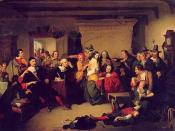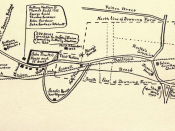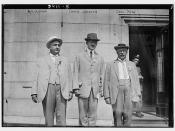Arthur Miller's play, The Crucible, is a great representation of humans and their inner struggles. This play takes place in the 1690's in a small Puritan community based on a rigid social system. An outbreak of rumors claiming witchcraft is spreading this small village, which causes conflict among the people of name and ultimately resultes in absolute disorder. However, within this chaos, self-battles of three characters are clearly illustrated.
Reverend Hale's battle is initiated by his personal commitment to God. He is a deeply religious man who was remorseless in his quest for the devil. Originally, Hale believes that there is witchcraft in the town and wants to drive it out. However as the play develops, Hale witnesses sincere and respected townspeople being sentences and hang. He learns that what is being done is definitely wrong and here begins his inner confusion. He tries to look into himself and figures out which way to go.
He does give frail attempt to talk to Danforth and explains how their actions are unjust, but again, his inner struggle pulls him back to his comfort zone. Hale then decides to persuade the wrongly accused to confess witchcraft. At least, he thinks, this will save them from death by hanging. He preaches perjury to the people, even though this is also against their religion. Hale's principles are ridden with guilt and sadness because of his struggle with himself.
John Proctor, a farmer and village commoner, is similarly faced with an inner turmoil. He has committed adultery with Abigail while his wife was sick. He is fully aware of his immoral actions. Once he thinks his problem has vanished, it comes back to slap him in the face. Abigail claims that Elizabeth, Proctor's wife, is a witch. Proctor then has to get involved in these witch trials and claims to be with the devil to save his wife. His inner struggle is whether or not to tell the truth or fake a confession to save his own life. He is confused as to which way to go and his main problem is his pride. John later states" My honesty is broke, Elizabeth; I am no good man." (136) He would rather confess than die as a sacrifice for honesty. However, as John confesses, he cannot allow Danforth to make it an official document. As Danforth asks him why John answers with a cry "How may I live without my name? Have given you my soul; leave me my name"ÃÂ (143). John feels strongly about having a good name and not dying with a bad one. Proctor weighs both sides of his internal conflict and realizes that he cannot live with another lie. He therefore, sentences himself to be hung and at least passes on his "good"ÃÂ name and some pride to his children.





